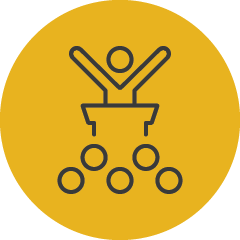
Opinions expressed in AGB blogs are those of the authors and not necessarily those of the institutions that employ them or of AGB.
Since 1991, AGB has been surveying board professionals from the public, independent, and institutionally related foundation sectors of higher education to capture data on their demographics, roles, responsibilities, and desires for professional development. The survey is conducted every five years. As in both 2015 and 2020, the majority of survey respondents in 2025 were from independent nonprofits (47.6 percent), followed by public institutions and systems (35.1 percent), and institutionally related foundations (11.6 percent). Respondents from for-profit institutions (5.3 percent) also participated. A new category was added for international institutions not fitting the definitions for U.S. sectors (0.4 percent).
This AGB Research Blog entry highlights selected results from this year’s report, with some comparisons to previous surveys.
The full 2025 AGB Survey of Board Professionals Report will be published later this year. It will include demographics, average salary data, new data about how board professionals’ duties and staffing have changed between Fall 2020 (the last survey, fielded during COVID-19 pandemic lockdown) and the present, and more extensive analysis of the categories previewed here.
Career Paths
As has been common in previous survey data, the 2025 results make it clear there is no single path to the board professional role. When asked to give their titles immediately prior to having assumed their present positions, respondents’ answers ranged from faculty-member positions to academic-administrative positions (for example, associate or vice provosts) to administrative roles (such as administrative or executive assistants to deans, chief financial officers, presidents, and other executives outside higher education). Some had worked in other fields (for example, K-12 education, politics, and state government).
How they became board professionals at their current employers, however, remained constant: They were predominantly recruited from within (58.9 percent of respondents). Some explained that board professional duties were added to their existing roles or that they convinced upper management to clearly delineate a board professional position. Only 17.6 percent of respondents from non-system public institutions, 14.3 percent of respondents from public system offices, and 11 percent of respondents from independent institutions were identified and recruited via a national search.
“Other Duties as Required”
This new question mined previous survey free responses to better quantify the “other duties as required” portion of board professional roles by creating a multiple-choice question based on earlier comments. (A partial list of 2020 free responses can be found in this series’ September 2024 entry, Other Duties as Required – AGB.) This year’s respondents were also invited to write in additional answers to the new question.
For this iteration of the survey, some respondents added as many as five additional areas of responsibility. Write-in responses included communications/marketing oversight, finance/budgeting, honorary degree processes, supervision of institutional research, record retention/FOIA/archival duties, “informal ombudsman,” strategic planning, student council work, and “thought partner with president.”
Table 1: Other Board Professional Responsibilities 2025 (alphabetical order)
| Responsibility | % |
|---|---|
| Accreditation liaison/officer | 5.6% |
| Advancement/fundraising | 9.0% |
| Compliance | 11.6% |
| Crisis management/emergency response planning | 15.5% |
| Enterprise risk management (ERM)/other risk management responsibilities | 6.0% |
| Government relations/advocacy | 14.6% |
| Legal (other than general counsel) | 6.4% |
| Planning key ceremonies (e.g., convocation or commencement) | 36.5% |
| Teaching (as adjunct or other faculty appointment) | 3.0% |
| Other | 43.8% |
Professional Development Activities and Related Interests
Increased participation in professional development webinars, first documented in 2020 survey results, remained relatively steady in the 2025 results. A total of 57.9 percent of respondents had participated in webinars on important higher education issues over the past year (1.7 percentage points lower than 2020), and another 40.3 percent had participated in webinars on college and university governance (7.5 percentage points lower than 2020). New to the survey this year was the AGB Board Professional Certificate Program as a professional development category; 30.5 percent of respondents had participated. (See Table 2.)
Table 2: Professional Development Activities Over Past Year
| Activity | % |
|---|---|
| Webinars on important higher education issues | 57.9% |
| Webinars on college and university governance | 40.3% |
| Conferences or meetings about college and university governance | 38.2% |
| Conferences or meetings about important higher education issues | 37.3% |
| Specialized trainings to enhance my job functions or responsibilities | 33.0% |
| AGB Board Professional Certificate Program* | 30.5% |
| Did not participate in any professional development over past year | 9.0% |
| Other | 8.6% |
*New to survey in 2024-2025
Respondents’ reasons for not participating in professional development over the past year included limited scheduling time (35.0 percent), participation costs (20.0 percent), and limited offerings suiting their professional goals (10.0 percent). The 35 percent choosing “other” were split between those new to their role and still learning their job and those for whom professional responsibilities were only a part of their job.
When asked what types of professional development they desired, the 2025 results differed slightly from those in 2020 in that the first-place answer in 2020, “Webinars on college and university governance,” changed places with the second-place answer in 2020, “Specialized trainings to enhance my job functions and responsibilities.” (See Table 3.) This year’s top desire for more specialized trainings could be due to increased experience among respondents requiring more specialized professional development, general webinar fatigue five years down the road from the lockdown environment when the 2020 survey was administered, or both. An additional 30.0 percent of respondents answered, “All of the above” when asked what activities they desired.
Table 3: Types of Desired Professional Development 2025
| Type | ;”>% |
|---|---|
| Specialized trainings to enhance my job functions or responsibilities | 50.6% |
| Webinars on college and university governance | 46.4% |
| Webinars on important higher education issues | 39.1% |
| Conferences or meetings on college and university governance | 35.6% |
| Conferences or meetings about important higher education issues | 25.8% |
| Career mentorship | 24.9% |
| All of the above | 30.0% |
| Other | 3.0% |
When asked to think back to the beginning of their career and choose the top five professional development topics that would have been useful to them as new board professionals, the top two (basic responsibilities and board governance) remained the same as in 2020. (See Table 4.) However, the third and fifth topics differed in 2025, possibly reflecting the number of newer board professionals who perceive a need for more emphasis on how boards are structured and organized and on parliamentary procedure.
Table 4: Top Five Most Useful Professional Development Topics for New Board Professionals
| Topic | % | Rank |
|---|---|---|
| Basic responsibilities of new board professionals | 73.4% | 1 |
| Board governance | 48.5% | 2 |
| Committee structures and board organization | 45.1% | 3 |
| Writing board minutes | 39.5% | 4 |
| Parliamentary procedure | 29.2% | 5 |
Takeaways
- As in the past, survey results showed no single career path to becoming a board professional. But also as before, most survey respondents were recruited from within their institutions, systems, or foundations.
- “Other duties as required” are extensive, varied, and often strategic in nature.
- More results from the 2025 AGB Survey of Board Professionals will be forthcoming later this year—stay tuned.
Lesley McBain, PhD, is senior director of research at AGB.
RELATED RESOURCES

Blog Post
Other Duties as Required

Webinar On Demand
Board Professional Basics

AGB Events
2025 Board Professionals Conference
![]()
Resource Hub
Board Professional Certificate ProgramTM

